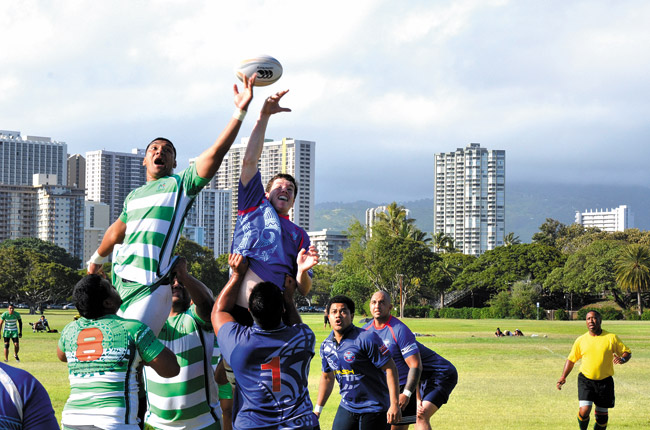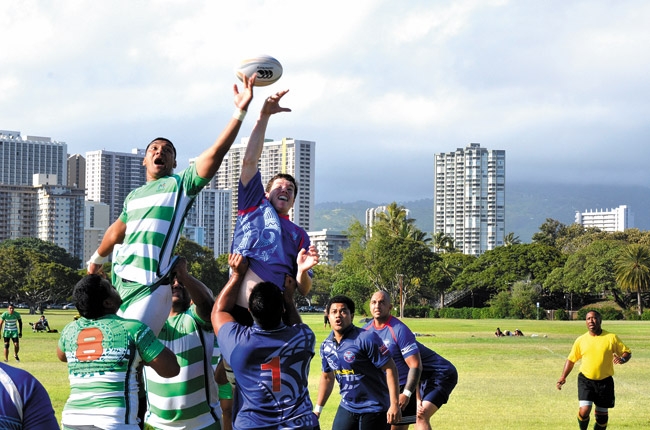Rugged
Hawaii is a long way from rugby’s epicenter in the United Kingdom, but that doesn’t mean people aren’t trying to transfer the state’s love for physical sports to the pitch. The latest effort begins Oct. 8 with the Hawaii Harlequins Rugby Championship at Kapiolani Park. The five-day tournament includes 10 teams from New Zealand, Australia, Canada and Hawaii in what organizers hope will boost the game’s popularity in the state.
Tracing rugby’s history in Hawaii is difficult. References to the game go back to the late 1800s, but its official local history began in 1964, when Irish ex-pat Dr. Jack Keenan and friends Bob Hampton and Brian O’Neill created the Harlequins – named for the Harlequin Football Club, a Rugby Union founding member that began play in 1866. Alexander Stokes is the current president and sees a future for rugby in Hawaii.
“Absolutely, we have the athletes to play rugby at a high level,” says the 39-year-old Stokes, who lists the state’s favorite sport as a surprising hindrance to rugby’s growth. One would think the passion for football would naturally translate to its sporting ancestor.
“Football is so predominant here it is hard to get (rugby) into the high schools,” he says. “That’s where you generate feeder teams for the adult leagues.”
Still, the transition is growing.
Former UH standout Leonard Peters made the transition, moving from the gridiron to playing for the USA Tomahawks squad. The Tomahawks play at the sport’s highest level and compete internationally. Peters was joined by six other Hawaii residents – Vai Notoa, Kelly McGill, Tala Esera, Dusten Umeda, Mosese Uitalia and Anthony Sunia – when the team took on Tonga at last year’s Ohana Cup in Aloha Stadium.
The Harlequins are members of the Rugby Hawaii Union, which includes nine teams on Oahu and Hawaii Island. Rosters contain a mix of Hawaii’s population – Samoans, Tongans, Hawaiians, haoles, military and ex-pats such as the British-born Stokes. A growing youth league existing primarily on Hawaii Island is creating the next wave of players.
The Harlequins and most clubs in Hawaii are Rugby Union organizations. This should not be confused with Rugby League, which is similar but different.
If you don’t understand the difference between union and league, don’t feel bad. Many involved in the sport suffer the same problem. What you really need to know is that when someone refers to rugby, they most likely mean Rugby Union. It is the more popular version of the sport, New Zealand’s famed All Blacks play Rugby Union. The World Cup, as seen in the movie Invictus, is Rugby Union.
Union began in 1871, when the English clubs gathered to codify the various rules under which the game was being played. Concerns over professionalism in the sport led to a split in 1892, after it became known that the Yorkshire clubs were compensating players for missing work. Both now have professional and amateur associations, and while it was at one time difficult to move between organizations, it is now quite common.
Union, because of its size, tends to be a bit more intense, according to Stokes. It also reflects the state’s style of play. “If you do a season in Hawaii and compare it to the Mainland, it’s much harder. And it’s hotter, and it’s more uncomfortable when the ground is harder. Generally, it’s a tougher game.”
Perhaps it’s a pleasurable difference for Stokes, who grew up playing in much different conditions. “We have the other side of the scale. You can have frost, freezing mud and rain. There is probably a happy meeting somewhere in Southern France,” he says with laugh.
Stokes, who is a professor at John A. Burns School of Medicine, believes the revival of rugby as an Olympic sport in 2016 will give it a boost. The U.S. boasts more than 450,000 players (including 67,000 high school students) and 2,500 clubs, and has a history of success at the games. The U.S. won gold in both 1920 and 1924 – the last year rugby was played as an official sport. It’s a small sample size but, hey, history is history.
Instead of rugby 15s (Union) or 13s (League), the Rio games will feature rugby sevens, or seven-person rugby teams. The promotion of the faster and more open version of the game is good for both the Olympics and the future of Hawaii rugby, says Stokes. “In a way, sevens is more important. That’s the one that we, as a club, can get into the national championship.”
Because of its location, the Rugby Hawaii Union champion gets automatic berth into the tournament – that is, if its players have the correct birth certificates. The Harlequins won the 2012 league title but were not eligible because of a number of foreign-born players on the team.
Proponents of rugby believe it a safer alternative to football. Stokes and others say the helmets and pads used in football increase the chance of severe injuries as players are able to turn themselves into missiles. The research, while rarely comparable, isn’t conclusive.
According to a 2002 study in the International Journal of Epidemiology, the injury rate of collegiate football was one-third the rate of New Zealand club Rugby Union. The article found the football injury rate of 39.89 per 1,000 games played. This compares to rugby, which had an injury rate of 114.07 per 1,000 games played. Concussion rates followed a similar difference, with football seeing 2.11 concussions per 1,000 games played to 5.16 for rugby.
Other academic works don’t seem to agree.
A 2008 study published in the Journal of the American Medical Association (JAMA) showed a much lower injury rate of 5.2 injuries per 1,000 rugby matches played. The JAMA study involved high school rugby players, which may account for some of the difference. Both studies cited the need for careful monitoring of players as key to reducing severe injuries.
Among those participating in the Harlequins Rugby Championship are players moving between the South Pacific and the continental U.S., which is a role the team is looking to fill. The team provides small scholarships to help players attend college and participate in camps in other locales. One of its big supporters is former All Black captain Murray Mexted, a part-time Hawaii resident who provides a half scholarship for Hawaii players to attend his camp in New Zealand.
The matches are open to the public and feature sevens, 15s, and a 10s match for the Kapiolani Women’s Championship. Go to the Harlequins’ website, hhrfc.org, for more information.







